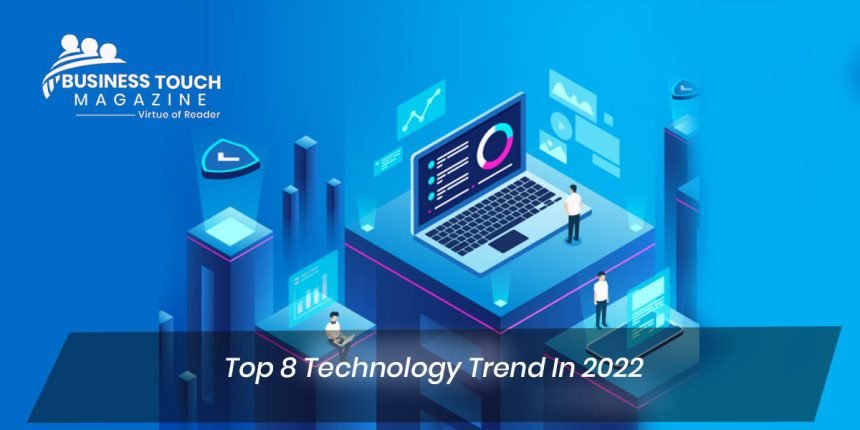Another pandemic year has gone by. Welcome to yet another year of hope and recovery. In 2021 we saw many tech trends accelerate in response to the ‘living with Covid’ world. If the past two years have proved anything, it’s that the world needs to adapt quickly to our new reality. In 2021, companies focused on operational agility more than ever before.
Tech has sustained us through the pandemic and continues to redefine and restructure how we work, live, and interact. But what does next year hold for us now in 2022?
1.Artificial Intelligence (AI)
Artificial intelligence has already received a lot of attention in the past decade and will continue to be one of the new technological trends as well. It has a notable effect on how we work, live, and respond. AI is known for its superiority in speech recognition and also navigation apps, smartphone assistance, and much other trending stuff. It is also further used to analyze interaction to determine underlying connections and insights. It is helping in services like hospitals, health care institutes, and more to make better decisions related to resource utilization. It also helps in studying the changing pattern of customer behavior which can be used in different sectors of industries to know their consumers better by analyzing real-time data.
2.Edge Computing
Cloud computing has become mainstream, with major players AWS (Amazon Web Services), Microsoft Azure, and Google Cloud Platform dominating the market. The adoption of cloud computing is still growing, as more and more businesses migrate to a cloud solution. But it’s no longer the emerging technology trend. Edge is.
As the quantity of data organizations are dealing with continues to increase, they have realized the shortcomings of cloud computing in some situations. Edge computing is designed to help solve some of those problems as a way to bypass the latency caused by cloud computing and get data to a data center for processing. It can exist “on the edge,” if you will, closer to where computing needs to happen. For this reason, edge computing can be used to process time-sensitive data in remote locations with limited or no connectivity to a centralized location. In those situations, edge computing can act like mini data centers.
3.Work-from-home becomes work-from-anywhere
We see remote work becoming hybrid and work-from-home becoming work-from-anywhere as people and companies continue to think beyond the office. As the next reality continues to take shape, technology will play a pivotal role in creating efficiencies and opportunities that transform our work and our lives, including:
- We will see more products, solutions, and services designed for the employee experience, new office designs and audio/video technology will pave the way for flexible meeting setups and new ways to build social connections.
- Artificial intelligence (AI) will continue to benefit us, although we predict that its ability to remove background noises during video calls may be among its lesser-known contributions to the future of collaboration.
- Augmented reality (AR) will create immersive workplaces for employees no matter where they are, with innovations such as ThinkReality A3 Smart Glasses that create interactive training experiences, multi-screen environments, and enhanced productivity.
- Virtual reality (VR), natural language processing, spatial audio, sensors, world-facing cameras, will continue to change how employees interact with technology and one another.
- More companies will shift spending to improve IT infrastructure. They will lean on outsourced and managed services increasingly secured through Device-as-a-Service (DaaS) IT acquisition models.
4.Quantum Computing
The next remarkable technology trend is quantum computing, which is a form of computing that takes advantage of quantum phenomena like superposition and quantum entanglement. This amazing technology trend is also involved in preventing the spread of the coronavirus, and to develop potential vaccines, thanks to its ability to easily query, monitor, analyze and act on data, regardless of the source. Another field where quantum computing is finding applications in banking and finance, to manage credit risk, for high-frequency trading and fraud detection.
5.Blockchain
Although most people think of blockchain technology about cryptocurrencies, blockchain offers security that is useful in many other ways. In the simplest of terms, blockchain can be described as data you can only add to, not take away from or change. Not being able to change the previous blocks is what makes it so secure. In addition, blockchains are consensus-driven, so no one entity can take control of the data. Robotic Process
6.Automation (RPA)
Robotic Process Automation, or RPA, is another technology that is automating jobs. RPA is the use of software to automate business processes such as interpreting applications, processing transactions, dealing with data, and more. For you as an IT professional looking to the future and trying to understand the latest technology trends, RPA offers plenty of career opportunities, including developer, project manager, business analyst, solution architect, and consultant.
7.Metaverse
The metaverse refers to a collection of shared online worlds in which physical, augmented, and virtual reality converge. People can hang out with friends, work, visit places, buy goods and services, and attend events. While many virtual worlds exist online, users currently can’t move between them while retaining their identities and assets. The eventual metaverse could solve this problem, turning disparate online worlds into a single, seamless entity. It has even been dubbed the next evolution of the internet.
8.Internet of Things (IoT)
Another promising new technology trend is IoT. Many “things” are now being built with WiFi connectivity, meaning they can be connected to the Internet—and each other. Hence, the Internet of Things, or IoT. The Internet of Things is the future and has already enabled devices, home appliances, cars, and much more to be connected to and exchange data over the Internet.
As consumers, we’re already using and benefitting from IoT. We can lock our doors remotely if we forget to when we leave for work and preheat our ovens on our way home from work, all while tracking our fitness on our Fitbits. However, businesses also have much to gain now and in the near future. The IoT can enable better safety, efficiency, and decision-making for businesses as data is collected and analyzed. It can enable predictive maintenance, speed up medical care, improve customer service, and offer benefits we haven’t even imagined yet.




